Did you know that in pre-colonial Philippine societies, elders were not just respected figures but the backbone of cultural preservation and governance? Their influence shaped the social fabric of communities, ensuring traditions and wisdom were passed down through generations. Elders held a unique position, acting as custodians of knowledge and leaders in both local and state-related matters.
In these communities, age was synonymous with wisdom. The elder members of society played a pivotal role in maintaining oral histories, which were crucial for cultural continuity. Their authority extended beyond family units, impacting the broader group and even the country as a whole. This hierarchical structure ensured that their voices were heard in matters of change and governance.
Understanding the role of elders in pre-colonial times offers valuable insights into how communities were organized and how traditions were preserved. Their legacy continues to influence modern perspectives on leadership and cultural identity. To explore more about the impact of colonial history on the Philippines, check out this detailed analysis.
Key Takeaways
- Elders were central to preserving cultural traditions and wisdom in pre-colonial Philippine communities.
- They served as leaders and decision-makers, influencing both local and state-related matters.
- Oral histories maintained by elders were vital for cultural continuity.
- Age was highly respected and equated with wisdom in these societies.
- Their legacy continues to shape modern views on leadership and cultural identity.
Historical Foundations in Pre-Colonial Philippine Society
In pre-colonial Philippine society, the foundation of community life was deeply rooted in the wisdom of its elder members. These individuals were not just respected figures but the architects of social order and cultural continuity. Their influence extended across families, villages, and even larger political structures, shaping the identity of the group and the country as a whole.
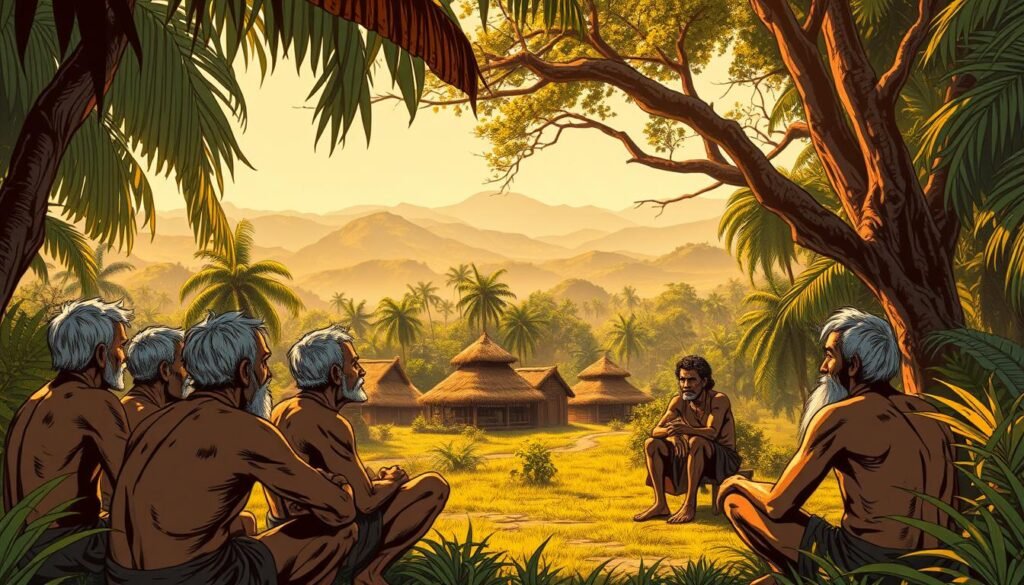
Social Structure and Hierarchical Roles
The social hierarchy of pre-colonial Philippines was built on a clear system of roles and responsibilities. Elder leaders, often referred to as Datus or Lakans, held significant authority. They were chosen based on their wisdom, leadership skills, and ability to mediate conflicts. This structure ensured that every member of the community had a defined role, fostering stability and cohesion.
Historical records show that these elder leaders were instrumental in managing change within their communities. Whether addressing local disputes or negotiating alliances with neighboring groups, their decisions were guided by a deep understanding of tradition and the needs of their people.
Cultural Traditions and Oral Histories
One of the most vital contributions of elder members was the preservation of cultural traditions through oral histories. Storytelling was a cornerstone of pre-colonial Philippine society, serving as a way to pass down knowledge, values, and historical events. These narratives were often shared during community gatherings, ensuring that the wisdom of the past remained alive for future generations.
Elder storytellers were not just keepers of history but also educators. They taught younger members about their heritage, instilling a sense of identity and pride. This practice highlights the enduring legacy of elder leadership in shaping the cultural fabric of the Philippines.
Elders and Their Role in Governance
The structure of governance in pre-colonial Philippines was deeply intertwined with the leadership of elder figures. These individuals were not just respected for their age but also for their ability to guide their communities through complex decisions and conflicts. Their wisdom was the foundation of stability and progress.
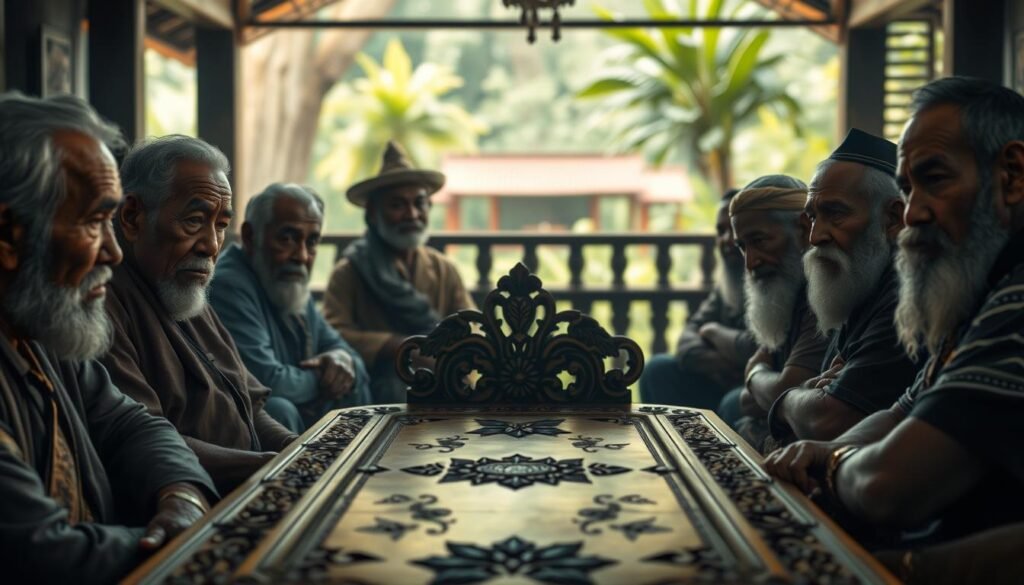
Council of Elders and Decision-Making
In many pre-colonial societies, councils of elders were the primary decision-making bodies. These groups were responsible for addressing issues that affected the entire community, from resource distribution to alliances with neighboring groups. Decisions were often made through consensus, ensuring that every voice was heard.
Historical records show that these councils played a vital role in maintaining order. For example, in some communities, elder leaders were tasked with mediating disputes and ensuring fairness. Their ability to balance tradition with emerging changes was key to their success.
Conflict Resolution and Leadership
Elder leaders were also central to conflict resolution. Their experience and impartiality made them ideal mediators. They used traditional practices and oral traditions to guide their decisions, ensuring that resolutions were both fair and culturally appropriate.
This approach to leadership was not unique to the Philippines. Similar systems existed in other parts of the world, such as the south Asian and African communities. These parallels highlight the universal value of elder leadership in governance.
To explore more about the historical roles of leaders in the Philippines, check out this detailed analysis.
Cultural Influence on Traditional Beliefs and Practices
The spiritual and cultural identity of pre-colonial Philippines was deeply shaped by the guidance of elder leaders. These individuals were not just respected for their age but also for their ability to preserve and transmit sacred customs. Their influence extended into every aspect of community life, from religious practices to storytelling traditions.
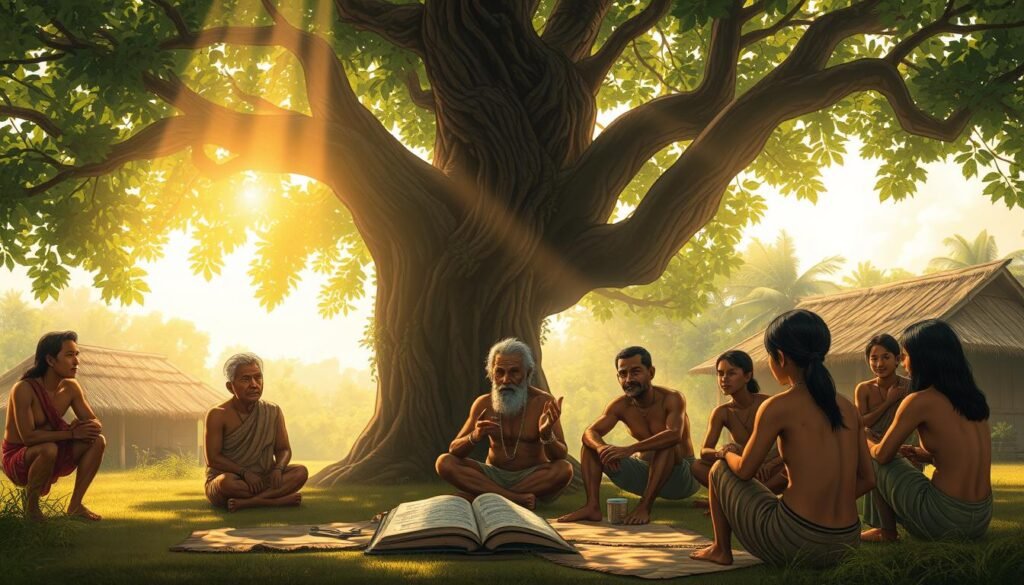
Religious and Spiritual Roles
Elder figures often served as religious and spiritual authorities in pre-colonial communities. They were tasked with maintaining sacred rituals and ensuring the continuity of traditional beliefs. These practices were not just confined to the family unit but were integral to the entire group.
Historical accounts highlight how elder leaders mediated between the spiritual and physical worlds. They conducted ceremonies that marked significant time periods, such as harvests or the start of a new year. These events reinforced the community’s connection to their cultural roots.
Oral Traditions and Storytelling
Storytelling was a cornerstone of pre-colonial Philippine society. Elder members were the custodians of oral histories, passing down knowledge through generations. These narratives were not just tales but lessons that shaped the moral and cultural fabric of the community.
During gatherings, elder storytellers would share myths, legends, and historical accounts. These stories served as a way to teach younger members about their heritage. The interplay between formal state-level practices and local traditions ensured that cultural identity remained intact despite external change.
This emphasis on oral traditions highlights the enduring legacy of elder leadership in shaping the Philippines’ cultural landscape.
Socioeconomic Impact of Elder Authority
In pre-colonial Philippine communities, elder authority extended far beyond cultural leadership, shaping the very foundations of trade, kinship, and resource distribution. Their influence ensured that economic practices were deeply rooted in tradition, fostering stability and cohesion within the group.
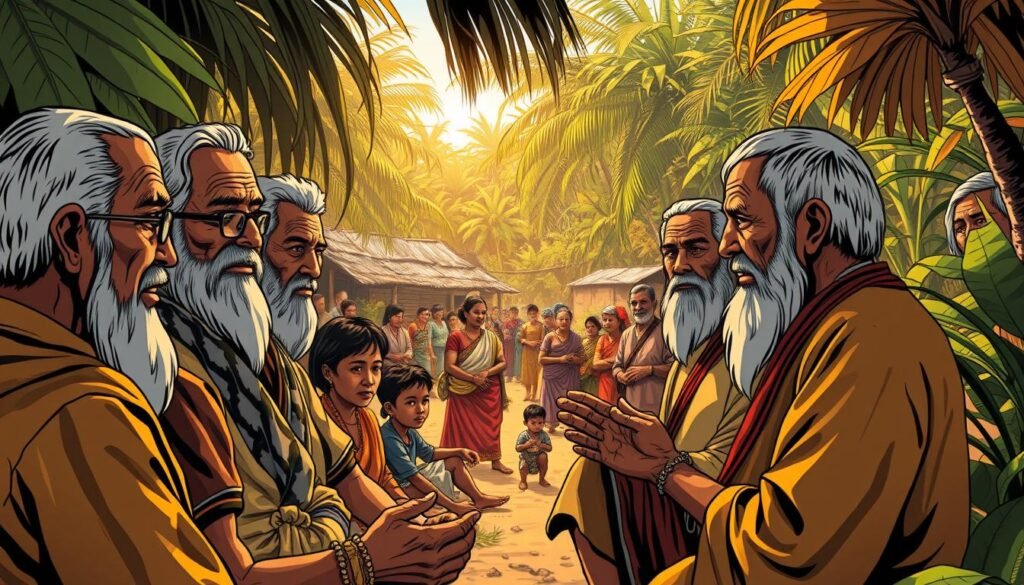
Trade, Kinship, and Resource Distribution
Elder leaders played a pivotal role in managing trade routes and kinship networks. Their decisions were guided by a deep understanding of local needs and long-standing traditions. This ensured that resources were distributed fairly, benefiting the entire society.
Historical records show that elder councils were instrumental in resolving disputes over trade agreements. Their impartiality and wisdom made them trusted mediators, ensuring that conflicts did not disrupt the flow of goods. This approach fostered economic stability across the country.
“The wisdom of elder leaders was not just cultural but economic, ensuring that trade and kinship networks thrived for generations.”
Resource distribution was another critical area where elder authority made a significant impact. They ensured that essential goods, such as food and tools, were allocated based on need rather than wealth. This practice reinforced the idea of communal welfare over individual gain.
Decision-Making in Economic Contexts
Elder councils were central to economic decision-making. They evaluated the needs of their communities and made time-sensitive decisions to ensure stability. For example, during periods of scarcity, they prioritized resource allocation to the most vulnerable members of the group.
Their decisions were often documented in historical records, providing valuable insights into the socioeconomic dynamics of the state. These documents highlight the enduring legacy of elder leadership in shaping economic practices year after year.
| Role of Elders | Impact on Community |
|---|---|
| Trade Route Management | Ensured economic stability and fair trade practices |
| Resource Distribution | Promoted communal welfare and reduced inequality |
| Conflict Resolution | Maintained harmony and prevented economic disruptions |
The socioeconomic impact of elder authority continues to be a subject of study. For a deeper understanding of how leadership shapes community welfare, explore this detailed analysis.
In conclusion, the role of elder leaders in pre-colonial Philippines was not limited to cultural preservation. Their authority extended into trade, kinship, and resource distribution, ensuring the stability and prosperity of their communities. Their legacy remains a testament to the enduring value of wisdom and tradition in shaping economic practices.
Regional and Multilingual Perspectives on Elder Identity
Across the Philippines, the role of elders varied significantly based on cultural and linguistic contexts. In pre-colonial times, the concept of an elder was not uniform but reflected the diverse traditions of each region. This diversity shaped how communities viewed their elder members, influencing their roles in governance, culture, and daily life.
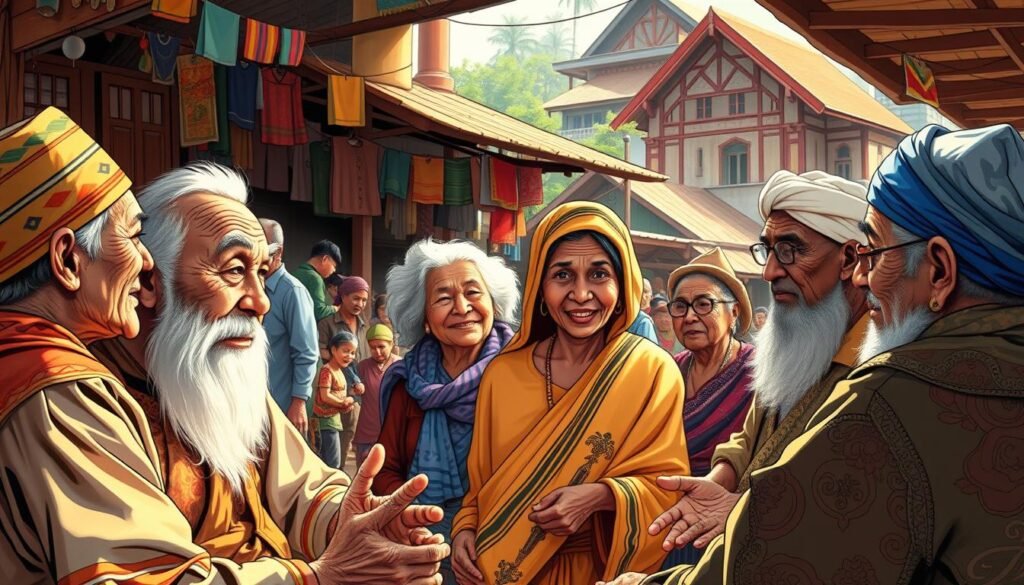
Comparative Analysis with Neighboring Societies
When comparing the Philippines to neighboring societies, similarities and differences in elder identity emerge. For example, in some south Asian cultures, elders were seen as spiritual guides, while in the Philippines, they often held dual roles as cultural custodians and decision-makers. This contrast highlights how regional traditions influenced the perception of elder authority.
In state-level societies, elder councils were common, but their functions varied. In the Philippines, these councils focused on preserving oral histories and mediating conflicts. This approach ensured that cultural identity remained intact despite external change.
Multicultural and Linguistic Variations
Language played a crucial role in defining elder identity. The word for “elder” differed across regions, reflecting unique cultural values. For instance, in some areas, the term emphasized wisdom, while in others, it highlighted leadership. These linguistic variations shaped how elder members were perceived within their group.
Multicultural influences also contributed to this diversity. Over time, interactions with neighboring countrys introduced new ideas about elder roles. This blending of traditions enriched the cultural fabric of the Philippines, creating a dynamic and evolving concept of elder identity.
“The diversity of elder identity in the Philippines reflects the country’s rich cultural heritage and linguistic complexity.”
To explore more about how multilingualism shapes cultural identity, check out this detailed analysis.
In conclusion, the identity of elders in pre-colonial Philippines was shaped by regional traditions, linguistic diversity, and multicultural influences. Understanding these perspectives offers valuable insights into the country’s cultural history and the enduring legacy of elder leadership.
Modern Interpretations of Traditional Elder Roles
The evolving role of elders in modern society reflects a blend of tradition and adaptation. While their historical significance remains undeniable, contemporary contexts have reshaped how their contributions are perceived and valued. This section explores how pre-colonial values are being revisited and the challenges faced in integrating these roles into today’s society.
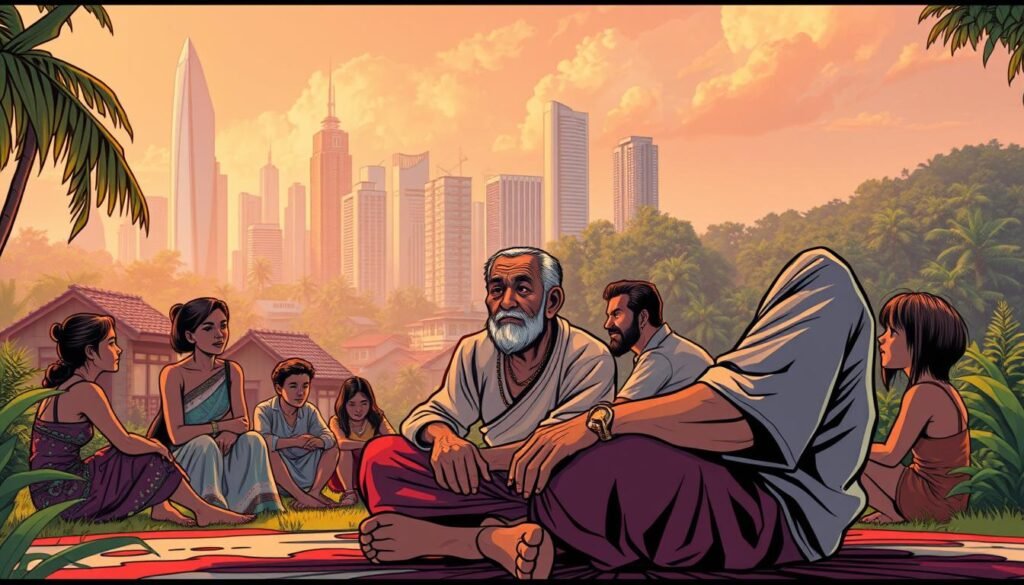
Revisiting Pre-Colonial Values
In many cultures, the elder was seen as a custodian of wisdom and tradition. Today, there is a renewed interest in these values, particularly in the south Asian and Philippine contexts. Communities are recognizing the importance of preserving oral histories and traditional practices that were once the domain of elder members.
For example, initiatives like The Elders aim to revive these roles by emphasizing their relevance in addressing modern issues. This change reflects a broader trend of honoring the past while adapting to the present.
Contemporary Relevance and Challenges
Despite their historical importance, elders face challenges in maintaining their position in a rapidly evolving world. Issues such as generational gaps and the erosion of traditional group structures have made it difficult to integrate their roles into modern governance.
Research shows that the symbolic weight of words and narratives remains powerful in uniting communities. However, ensuring that elders are valued requires ongoing efforts to balance tradition with the demands of contemporary society.
“The wisdom of elders is not just a relic of the past but a guiding force for the future.”
| Aspect | Modern Interpretation |
|---|---|
| Cultural Preservation | Reviving oral histories and traditional practices |
| Governance | Integrating elder wisdom into decision-making |
| Community Leadership | Addressing generational gaps and modern challenges |
In conclusion, the role of elders continues to evolve, reflecting both the challenges and opportunities of our time. By revisiting pre-colonial values and addressing contemporary issues, society can ensure that their contributions remain relevant for generations to come. For more insights, explore this detailed analysis.
Conclusion
The enduring legacy of elder leadership in pre-colonial Philippines continues to shape modern perspectives on community and culture. These respected figures were not just custodians of wisdom but also key decision-makers, influencing governance, conflict resolution, and cultural preservation. Their roles ensured that traditions were passed down through generations, fostering a strong sense of identity within the group.
Today, their contributions inspire initiatives that honor traditional values while addressing contemporary challenges. For example, programs like family caregiver training highlight the need to equip modern members with skills to support older adults. Similarly, the participatory approach in addressing social isolation reflects the timeless relevance of elder wisdom.
As we look to the future, it’s clear that the lessons from the past remain vital. By revisiting these roles, society can ensure that the contributions of elders continue to enrich our communities. Their legacy is a testament to the enduring power of tradition and the importance of respecting those who guide us.
FAQ
What was the role of elders in pre-colonial Philippine communities?
In pre-colonial Philippine communities, elders played a vital role in governance, cultural preservation, and conflict resolution. They were respected leaders who guided decision-making and upheld traditions.
How did the social structure in pre-colonial Philippine society function?
The social structure was hierarchical, with elders holding significant authority. They were part of councils that made decisions, resolved disputes, and ensured the community’s welfare.
What were the cultural traditions preserved by elders in pre-colonial times?
Elders maintained oral histories, religious practices, and storytelling traditions. These were passed down through generations, preserving the community’s identity and values.
How did elders contribute to governance in pre-colonial Philippines?
Elders were central to governance, serving on councils that made key decisions. They also led conflict resolution efforts, ensuring harmony and stability within the community.
What was the socioeconomic impact of elder authority in pre-colonial times?
Elders influenced trade, resource distribution, and kinship ties. Their decisions shaped the community’s economic and social dynamics, fostering cooperation and mutual support.
How did elder roles vary across different regions in the Philippines?
Elder roles varied based on regional cultures and languages. While their authority was widespread, specific practices and traditions differed across communities and neighboring societies.
How are traditional elder roles interpreted in modern Philippine society?
Modern interpretations often revisit pre-colonial values, emphasizing respect for elders and their wisdom. However, contemporary challenges like urbanization and globalization have shifted their roles.
Source Links
- Cultural achievements of pre-colonial Philippines
- Barangay
- Precolonial barangay
- A History of the System of Education in the Philippines – Its Implication for the Present Generation
- Six Responsibilities for the Elders of Every Church
- Governance: The Four Roles of a Church Board (or Elders)
- The Role of the Elder, Bishop, and Pastor
- American Indians 4-02.doc
- RELIGIOUS, SPIRITUAL, AND TRADITIONAL BELIEFS AND PRACTICES AND THE ETHICS OF MENTAL HEALTH RESEARCH IN LESS WEALTHY COUNTRIES*
- Importance of Indigenous elders’ contributions to individual and community wellness: results from a scoping review on social participation and intergenerational solidarity
- The impact of socioeconomic status on the health of elderly individuals in China – Discover Global Society
- The Impact of Socioeconomic Factors and Geriatric Syndromes on Frailty among Elderly People Receiving Home-Based Healthcare: A Cross-Sectional Study
- A Scoping Review of Aging Experiences Among Culturally and Linguistically Diverse People in Australia: Toward Better Aging Policy and Cultural Well-Being for Migrant and Refugee Adults
- Risk factors for loneliness among older people in a Nordic regional context – a longitudinal study | Ageing & Society | Cambridge Core
- Respect for Elders and culture
- Elders’ perspectives and priorities for ageing well in a remote Aboriginal community | Ageing & Society | Cambridge Core
- Conclusion – Social isolation and loneliness in the elderly

